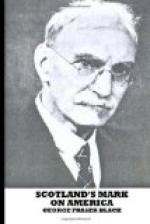Lord Bacon expressed his regret that the lives of eminent men were not more frequently written, and added that, “though kings, princes, and great personages be few, yet there are many excellent men who deserve better fate than vague reports and barren elegies.” Of no country is this more true than the United States. An examination of the innumerable early biographical dictionaries with which the shelves of our public libraries are cumbered, will show that the bulk of the life sketches of the individuals therein commemorated are vague and unsatisfactory. In nearly every case little or no information is given of the parentage or origin of the subject, and indeed one work goes so far as to say that such information is unnecessary, the mere fact of American birth being sufficient. However pleasing such statements may be from an ultra patriotic viewpoint it is very unsatisfactory from the biological or historical side of the question, which is undoubtedly the most important to be considered. The neglect of these items of origin, etc., makes the task of positively identifying certain individuals as of Scottish origin or descent a very difficult one. One may feel morally certain that a particular individual from his name or features (if there be a portrait) is of Scottish origin, but without a definite statement to that effect the matter must in most cases be left an open question. One other cause of uncertainty, and it is a very annoying one, is the careless method of many biographers in putting down a man’s origin as “Irish,” “from Ireland,” “from the north of Ireland,” etc., where they clearly mean to state that the individual concerned is descended from one of the many thousands of Scots who settled in Ulster in the seventeenth and eighteenth centuries. Notwithstanding this uncertainty the proportion of men of undoubted Scottish origin who have reached high distinction, and whose influence has had such far reaching scope in the United States, is phenomenal. “Let anyone,” says Dinsmore, “scrutinize the list of names of distinguished men in our annals; names of men eminent in public life from President down; men distinguished in the Church, in the Army, in the Navy, at the Bar, on the Bench, in Medicine and Surgery, in Education, trade, commerce, invention, discovery—in any and all of the arts which add to the freedom, enlightenment, and wealth of the world, and the convenience and comfort of mankind; names which have won luster in every honorable calling—let him scrutinize the list” and he will be astonished to find how large a proportion of these names represent men of Scottish birth or Scottish descent. In these pages it is obviously impossible to mention every Scot who has achieved distinction—to do so would require a large biographical dictionary. We can here only select a few names in each class from early colonial times to the present day.




